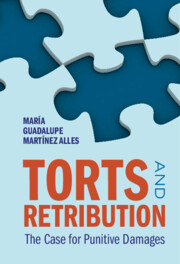Refine search
Actions for selected content:
2 results
4 - Relational Retribution
- from Part II - The Retributive Rationale
-
- Book:
- Torts and Retribution
- Published online:
- 09 August 2025
- Print publication:
- 28 August 2025, pp 122-149
-
- Chapter
- Export citation

Torts and Retribution
- The Case for Punitive Damages
-
- Published online:
- 09 August 2025
- Print publication:
- 28 August 2025
